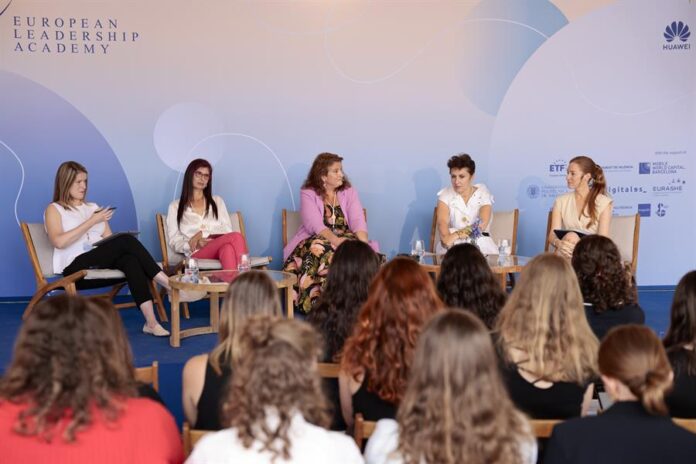
Marta Rojo
Valencia, Spain.- The integration of female professionals into the development of artificial intelligence (AI) algorithms could prevent discriminatory biases that «intensify gender gaps,» and holds the potential to «transform Europe» as it steers toward a «technology-based society.»
This was the consensus among the speakers at the «Women’s Role in the Future of Europe» conference, which took place at the School of Women’s Leadership, a training session for student girls from all over Europe concluding Friday in Valencia, Spain. The event was sponsored by the Chinese technology company Huawei.
«Technology can embody absolutely all biases we humans have because it is created by humans,» said Cecilia Danesi, a professor at the University of Salamanca and researcher in artificial intelligence.
AI, she said, has a «central role in protecting women’s rights,» if we manage to correct the fact that «often, algorithms play a role in intensifying social gaps like gender ones.»
In her view, it is essential to have «AI with women, more diversity and a human rights ethical perspective,» focusing on «prevention, not sanctions.» Therefore, she highlighted the importance of the European AI Law, referring to it as «an example of excellence in the development of ethical AI.»
A SECTOR DOMINATED BY MEN
For Tamara Tafra, Ministerial Advisor for Cybernetic Affairs and Disinformation at the Permanent Representation of Croatia to the European Union, the opening of the tech sector to women shows «progress, but it is still very small.»
«In all this time that Croatia has been in the Union, I have seen some changes in technology,» said Tafra, for whom technology was traditionally «a male-dominated area.»
Now, she said, there have been changes, and some women are in positions of power, but «not many, to be honest.» Yet, even this number is an improvement compared to her father’s generation when tech studies were all-male classes.
WOMEN’S LEADERSHIP WITHOUT «ESSENTIALIZING»
Fanny Benedetti, a global women’s leadership expert and former executive director of UN Women France, also participating in the conference, underscored the importance of female leadership at a time when «the European agenda is facing an environmental, economic, social, and also ethical crisis that needs addressing and cannot be handled with the previous perspective.»
«Facing these problems is different for women because the world is not always in favor of women in decision-making,» the expert considered.
On the characteristics of female leadership, she refused to «essentialize» women: «Just because you are a woman, you are not a better leader or more understanding, I don’t believe in that. But we are educated differently because of our gender, and this shapes our view of the world.»
«The idea is that women use their skills and are authorized to do so in a world shaped by men, without being stereotyped or forced into certain types of leadership,» she concluded.
GENDER PERSPECTIVE IN TECHNOLOGICAL DEVELOPMENT
During her intervention, Soulla Louca, Head of the Department of Digital Innovation at the University of Nicosia in Cyprus, advocated for training women «so that they have digital skills and can minimize the existing gaps.»
«We want a society based on technology, but also using technology to combat various global challenges we face,» she said.
In her view, women can contribute to solving future challenges because they have «the emotional intelligence and empathy required.» Thus she demanded a greater female presence in technological development and design: «It is necessary so that technology includes a gender perspective.»
WOMEN IN AVIATION: MORE THAN FLIGHT ATTENDANTS
The Palacio de la Exposición then hosted the debate «Reaching for the skies, how women are shaping the world of aviation,» in which the speakers agreed that aviation professions encompass much more than just «pilots and flight attendants.»
This was stated by aerospace engineer Martina Hlavata, who recognized that when you are «outside the aviation bubble,» you only “know about the jobs associated with flight execution: pilots, flight attendants, cabin crew, and maybe check-in agents.»
«But there is much more,» claimed Hlavata, who has worked as an expert in collision prevention mechanisms and the development of aircraft safety networks, and is now an aerospace engineer specializing in managing aircraft capacity.
According to Romana Kmetová, an air traffic controller at Air Navigation Services of the Czech Republic, the current challenge of aviation is to achieve «a single European sky,» a task where the inclusion of women is still a work in progress, even in her country, where only 5 to 7% of air traffic controllers are women.
«All women are welcome in aviation because they bring a different approach to a very dynamic profession,» highlighted Simona Franková, CEO of NG Aviation SE, who advocated for including technical positions: «We are digitizing data for aviation, and it’s a great opportunity for professional women.»
For Norwegian Airlines pilot Andrea Davies, «there are opportunities in aviation for women,» and this field «is a very open world» that is recently fostering many initiatives to open it to female profiles.
Tereza Topková, traffic management expert and member of Eurocontrol, regarded her work as an «unknown part» of the aviation world: «From my job, I can see this is a man’s world, and having more women in this field would bring a lot of innovation and a different way of thinking.»



















